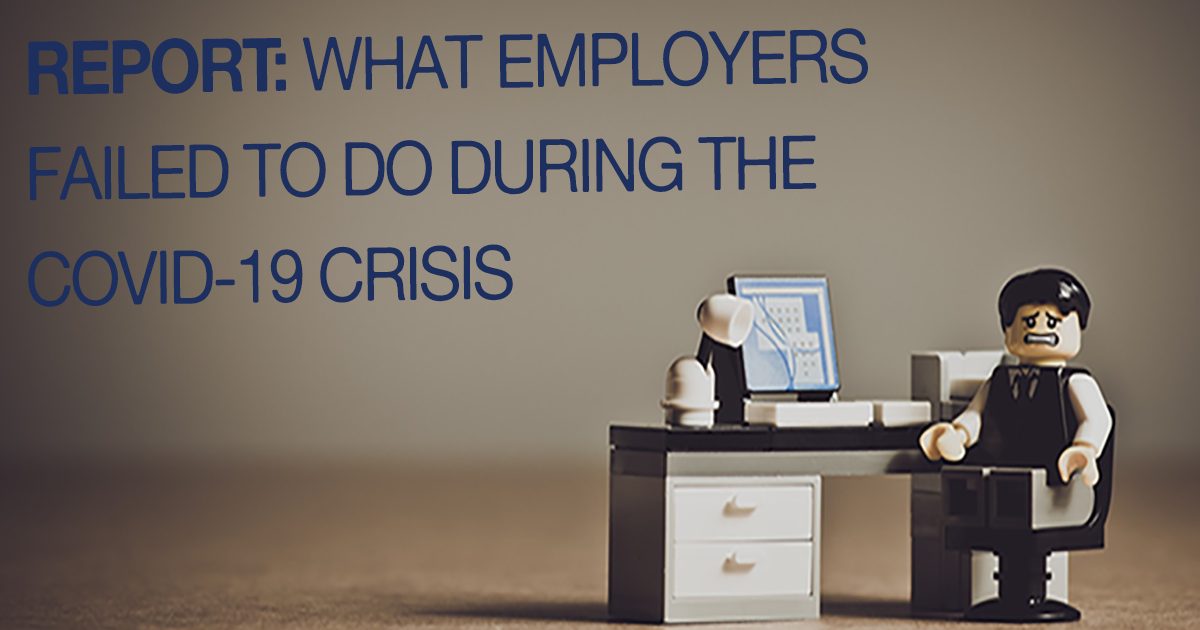
Report: What Employers Failed to Do During the COVID-19 Crisis
Employers across the country during the early stages of the COVID-19 pandemic scrambled to transition their employees to work-from-home arrangements. While many businesses pivoted successfully, others failed miserably. But all employers have already learned valuable lessons after completing the intense process of shifting teams to remote work.
Many businesses weren’t prepared to operate with remote workers in early 2020. At the onset of the coronavirus crisis, 66 percent of employees believed their company was somewhat to very prepared for all employees to work from home. Still, a remaining 34 percent felt the opposite, according to a report published by Owl Labs. The reality was that it didn’t matter whether businesses were ready to adapt; stay-at-home orders forced them to change the way they were conducting business.
With everything happening so fast, businesses rushed to keep up with the overwhelming amount of information being thrown at them daily, especially from local, state, and federal authorities. Many companies — small businesses in particular — didn’t have the time and resources to make significant changes to day-to-day business operations quickly.
Businesses did the best they could at the time with the data they had, but some issues, unfortunately, went unnoticed. If these mistakes, many of which are technical in nature, aren’t corrected immediately, many businesses could be faced with a long road ahead, making financial recovery less likely.
PC Matic recently published a report on the American-workforce’s ability to adopt remote working capabilities amidst the COVID-19 crisis. With data compiled from 6,000 U.S. employees, the cybersecurity firm’s researchers analyzed trends between cybersecurity and employees working from home as a result of the COVID-19 pandemic. What the researchers found may be shocking to many businesses but not to IT professionals aware of the dangers of employees working from home.
Failing to issue corporate-owned devices
When employees use personal devices for work-related tasks, they unintentionally put company data at risk. Personal devices typically aren’t adequately protected from the ever-growing IT threat landscape. For instance, they usually don’t have the right security solutions in place, which is why IT professionals recommend businesses issue devices for work-related matters.
Amid the coronavirus crisis, many businesses failed to adhere to the advice of IT professionals. Only 39 percent of employees were issued a device during the COVID-19 pandemic, according to PC Matic’s survey. It’s still too early to tell what this alarming statistic means for businesses in the coming months, but the outcome isn’t expected to be good.
Employers failed to provide antivirus solutions for personal devices.
If businesses can’t afford to issue corporate-owned devices to their employees, they can, at the very least, provide them with antiviruses solutions. Still, during the COVID-19 pandemic may firms failed to do just that. According to the report, ninety-three percent of employers didn’t offer their employees an antivirus solution to install on personal devices being used for work purposes. Having no antivirus software increased the likelihood of cyber criminals being able to deploy cyberattacks against these businesses.
Not providing additional IT support
Especially when they’re working from home, employees must always have access to IT support. While more than 50 percent of employers provided IT support to employees during the coronavirus crisis, which is a good thing, that’s only half. The remaining 50 percent are at risk. When employees can’t work efficiently with IT professionals, they go around them, which is a huge problem.
If your employees are currently working from home and you’ve made some of the mistakes above, it’s time for you to reassess your IT strategy and make adjustments.
About the Author: LammTech
Related Posts
-
Data Loss Prevention – Best Practices and Common DLP MistakesFebruary 1st, 2022
-
Why Upgrading to Windows 11 Now is a Smart MoveSeptember 29th, 2023
-
Data Privacy Week 2024January 18th, 2024
-
How Advancing AI is Changing Cyber Security and Your Cyber ResilienceFebruary 26th, 2024
-
Data Privacy Week 2024January 18th, 2024
-
Current Cyber Attacks Unfold - Invest in Cybersecurity!December 5th, 2023